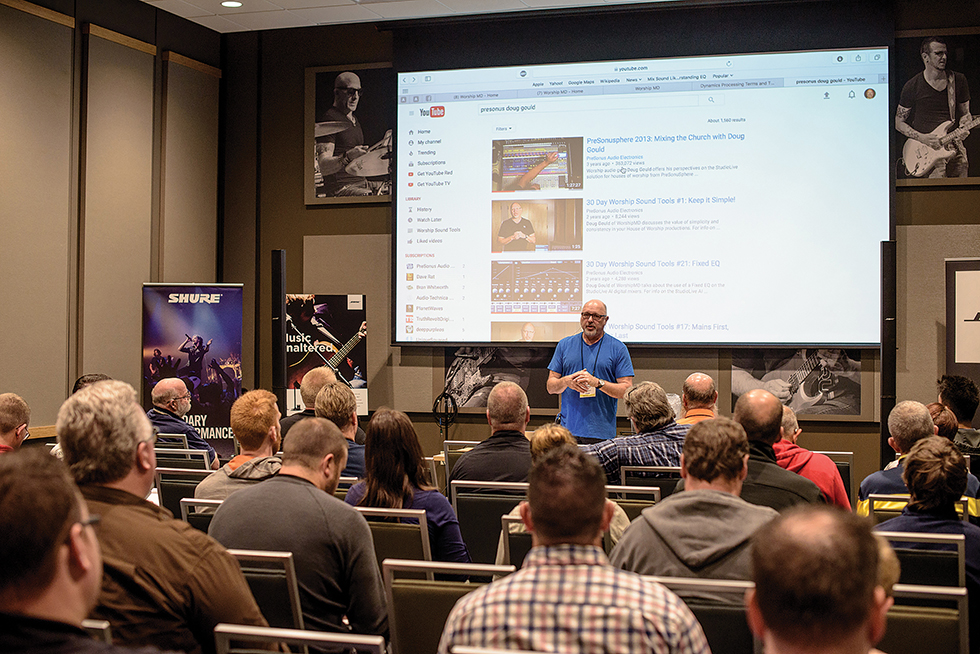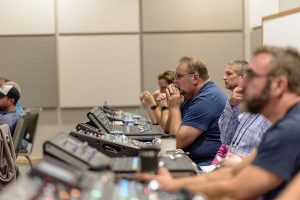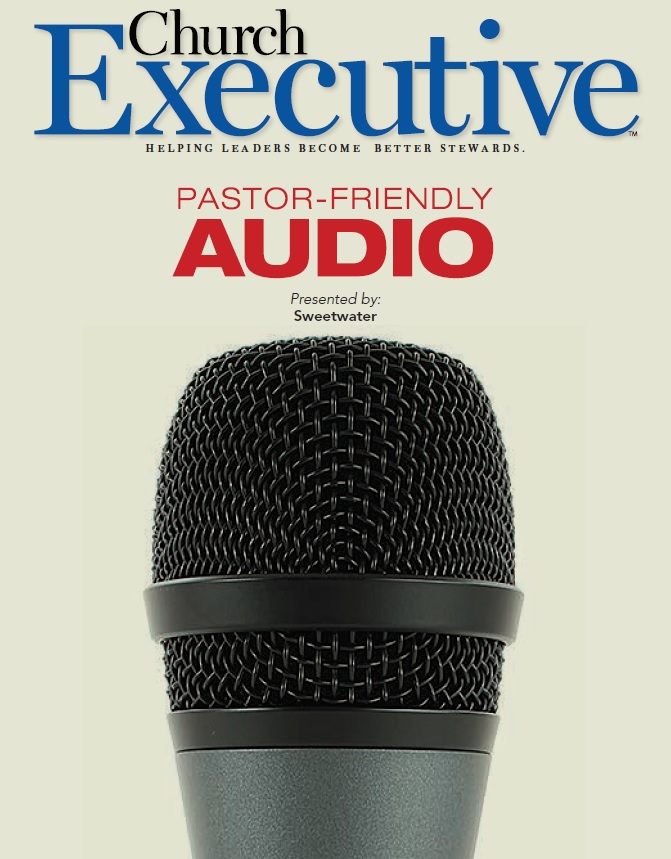
By Jeff Barnett
 When you buy new gear, there’s always a measure of anticipation. The new and enhanced features, the easier workflow, the ability to do more and bigger things — it’s simply exciting.
When you buy new gear, there’s always a measure of anticipation. The new and enhanced features, the easier workflow, the ability to do more and bigger things — it’s simply exciting.
But just purchasing new gear won’t take you all the way to a job well done. That takes a well-trained tech team who understands not only the purpose of the mission, but also how to get the most out of that gear.

To make that happen, your team must train — the same approach by which anyone gets better at anything. And here are the best 6 reasons for doing so:
God deserves it.
The top reason for you, as a tech team member, to work hard at honing your craft? Because it honors God.
Skillful training is a means to offering our very best — and God is worthy of our very best. This truth applies universally, whether you’re serving as a vocalist, musician, or as part of the tech team.
When you decide to invest time in learning how to do things well, studying up on best practices, and getting better through rehearsal, it makes a bold statement about what matters.
Your team deserves it.
By performing your tech role well, you’re honoring the commitments that you and everyone else on the team have made to the ministry. If several talented people are on stage, there’s a good chance they spent years working on their craft. As an example, think about the keyboardist who has taken lessons since she was 4 years old.
When you do your job well — through preparation and training — it honors and compliments the countless hours your fellow team members have spent on their own skills and musicianship.
Your congregation deserves it.
It’s easy to get focused on your own journey to worship each week, but think about the members of your congregation for a moment. They, too, got out of bed, packed up the family, and drove across town in the hope of spending some time together in the presence of God in a way that’s only accessible when we gather.
If you’re not providing an environment that helps facilitate worship and keeps them free from distractions, you’re not serving them well.
Training builds confidence.
You enjoy the gear most when you understand how to use it well. Especially with today’s advanced features, new gear always presents a learning curve.
Think about the last time you got a new smartphone. Yeah, like any phone, it makes calls — but it probably took days or weeks before you really felt comfortable using all the features.
The same principle is true for even the most experienced tech person. There’s always some change to the workflow, menus, and device performance — and Sunday morning isn’t the time to figure that out.
Knowing how the equipment will perform (especially in the context of your particular application) will give your tech team members the confidence they need to serve their team well and provide the best experience for everyone in the room.
Training reduces frustration.
If your church is like most, your tech team is probably comprised mostly of volunteers. Many of them might not necessarily have deep experience, but they do have the heart to serve and a capacity to learn. Even so, a lack of know-how and training is a recipe for frustration — and the last thing you want to do is frustrate your team, especially volunteers.
Training helps inform the people on your tech team on how to best accomplish their goals and get the most out of the equipment. It maximizes your system performance, improves efficiency, and ultimately increases your team’s sense of accomplishment and satisfaction.
Training demonstrates value.
Whether it’s time, money or both, training requires an investment.
When you invest in training for your tech team, it sends a strong message about what matters: their growth and development. (Conversely, if you don’t invest in training, it says a lot about what you don’t value.)
To evaluate the value of training, add up how much productivity, time and energy is being squandered due to lack of proper training. How could that wasted time and energy be put to better use within the ministry?
There are two modes of training, and they’re both vital. The first is training on the fundamental principles and techniques. The second type is individual training on specific gear.

Training on the fundamentals doesn’t require an instructor who knows the specifics of your equipment or situation; instead, it focuses on the basics of a craft.
For audio engineers, this could include microphone technique; understanding what causes feedback; or how to use an equalizer. For lighting designers, training might include color theory; types of lighting fixtures and their uses; and understanding how to use light and shadow to mirror or enhance the emotion of a song or scene.
Fundamentals training is readily available in the form of classes, workshops, books, websites, videos, and more. Techs don’t necessarily “graduate” from this sort of training, because training on the fundamentals really never ends; there are always new skills to acquire and new techniques to learn.
The best technical professionals continue learning throughout their careers. I’ve been teaching classes on live sound for years, but I still learn something new every time I see someone else teach.
Gear-specific training is a little trickier. It requires someone who is familiar not only with the fundamentals, but also with your specific equipment.
This is the type of training that good system integrators provide as part of their service after an installation or system upgrade. Some equipment manufacturers occasionally sponsor workshops and training events, or post videos to their websites with equipment-specific training.
In a pinch, this type of training might even come from a trusted friend at another church who happens to use the same gear.
Finally, there’s the subject of practice. You would never ask a musician to learn to play a new instrument on Sunday morning in front of the congregation. He or she would need to spend hours practicing at home before being ready to play in front of others.
Yet, churches ask technical personnel to do this all the time. In some ways, practice for the technical arts is even more challenging than practicing a musical instrument, since it requires access to gear that most of us don’t readily have at home.
As such, it’s vital for technical volunteers to be allowed and encouraged to come in and practice using the equipment when the congregation isn’t present. Practice is a time when experimentation is encouraged, and there’s freedom to make mistakes (i.e., not on Sunday morning).
It’s great if musicians can also be present for technical rehearsals, but remember the value of practice for tech team members in particular. They aren’t simply there to run sound and lights for the rehearsal; they’re there to get better at their craft.
Tech team training: recommended resources
For helpful articles and the latest news about tools and technology to help make a difference in your worship ministry: sweetwater.com/worship
To learn how to prevent feedback, develop awesome mixing skills, and create a beautiful sound: behindthemixer.com
For actionable learning resources and simple-to-understand strategies: learnstagelighting.com
For practical training in audio and acoustics, online training, classes, private seminars and more:
prosoundtraining.comFor live coaching now: mxu.rocks
For insider secrets to quickly and effectively maximize sound system tuning in any room: proaudioworkshopseeingsound.com
For professional audio training online or in-person — for audio professionals and system integrators: prosoundtraining.com
“The Ultimate Church Sound Operator’s Handbook” by Bill Gibson: sweetwater.com/UltChurchSnd
“Guide to Sound Systems for Worship” by John Eiche: sweetwater.com/YamahaWorship
Jeff Barnett is the Director of House of Worship Sales at Sweetwater. Barnett is an instructor in Sweetwater’s Academy of Music and Technology, teaching live sound techniques. His background includes live sound engineering, recording engineering, system design, and installation. He is also a performing musician, singing in a vocal jazz group. Over the course of his career, Barnett has helped equip thousands of churches and musicians for their ministry.
Call your Sweetwater Sales Engineer at (800) 222-4700 to start the conversation, or go to Sweetwater.com/worship for helpful articles, how-to’s and interviews with leaders from the worship community!


